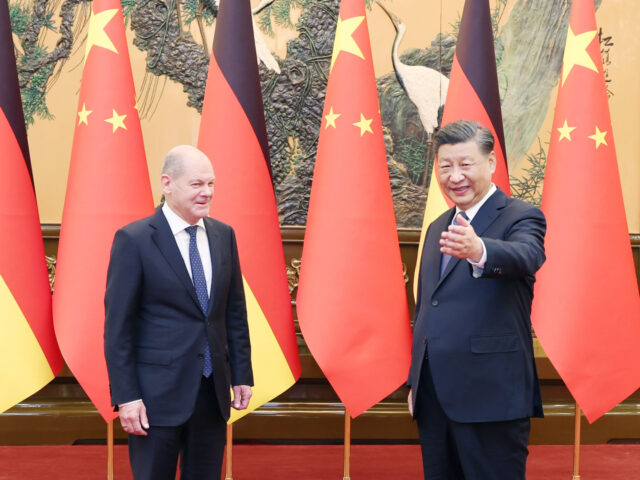German Chancellor Olaf Scholz became the first Western leader to travel to Beijing to meet with Xi Jinping since the Chinese coronavirus crisis on Friday.
Chancellor Scholz, of the leftist Social Democratic Party (SPD), made the trip alongside top industry leaders, including the CEOs of BMW, Bayer, Deutsche Bank, and Volkswagen, in order to shore up relations with Germany’s top trading partner as relations with its largest energy importer, Russia, have collapsed over the past year.
Speaking alongside soon-to-be-ousted Premier Li Keqiang, Scholz said in remarks reported by AFP: “We do not believe in ideas of decoupling [from Communist China] but it is also clear that that has something to do with economic ties as equals, with reciprocity.”
The statement has raised eyebrows, given that Xi Jinping was last month granted a third term as the General Secretary of the Chinese Communist Party (CCP) — the only such leader since Mao Zedong to be elevated to such a status — meaning that the so-called “paramount leader” (read: emperor) likely sees no one on the world stage as his equal.
Indeed, Maximilian Terhalle, Professor of Geopolitics at the University of Potsdam, said in response to the comments from Scholz: “China does not see us as equal, Germany is only an instrument.”
The state visit from Scholz has been a centre of controversy in his home country and throughout the West, with fears being expressed that Germany is once again embarking on the path of becoming over-reliant upon dictatorial regimes for the sake of its economy.
Last month, the heads of Germany’s intelligence apparatus collectively warned that the Scholz government was being “naive” in trying to deepen economic ties with China on the heels of falling into an energy crisis due to its Russian gas addiction.
Fool Me Twice: German Intel Warns ‘Naive’ Govt Against Falling Into Trap of Over-Reliance on Chinahttps://t.co/3eNr6myxYn
— Breitbart London (@BreitbartLondon) October 19, 2022
The German chancellor, who cast himself as a representative of Europe ahead of the trip, supposedly attempted to raise the issue of China’s effective backing of Russia in the war in Ukraine, calling on Beijing to “use its influence” over Moscow to prevent an escalation in the conflict, notably in regards to a potential nuclear strike.
Mr Scholz also promised to raise issues of human rights, such as the situation in Xinjiang, which has been characterised by the United States State Department and the British and the Canadian parliaments as a genocide, with millions of Muslim Uyghurs and other ethnic minorities being subjected to torture, rape, organ harvesting, and forced sterilisation.
It is doubtful whether such protestations from the German leader, if he actually made them, will carry much water, especially given the fact that many German industries have been implicated in benefitting from forced labour in Xinjiang, including major brands such as BMW, Volkswagen, and Hugo Boss — all of which ironically got their start in Nazi Germany.
Sir David Alton of the House of Lords in Britain said: “Olaf Scholz should read Eric Vuillard’s The Order Of The Day. It describes the role of German industrialists in the rise to power of the German Nazi party. 80 years later, CEOs of some of the same companies are meeting the CCP. Love affairs with dictators have unhappy endings.”
My cartoon on Scholz‘s China visit.
舒尔茨访华 pic.twitter.com/dggnUjNRn2— 巴丢草 Bad ї ucao (@badiucao) November 4, 2022
The trip comes on the heels of Scholz signing off on the sale of a partial stake in the port of Hamburg, the largest in Germany, to Communist China, despite widespread objections, reportedly including from within his own coalition government, which also includes the far-left Greens and the liberal Free Democrats.
While the focus over the past year has been on Russia’s undue influence over Europe, China has quietly continued expanding its holdings, particularly of ports, to shore up its dominance in the international shipping trade.
According to state-run mouthpiece The Global Times, Scholz’s visit to Beijing “sends a clear message to the world that globalization is an irreversible trend as the U.S. ramps up efforts to gang up for forming anti-China small cliques and forge a certain political correctness within Europe of defining China as a rival, and Scholz’s visit will encourage and inspire more Western countries’ leaders to increase communication with China.”
The Chinese state overtook the United States as the European Union’s top trading partner in 2020, as ties between Brussels and the communist dictatorship in Beijing continue to deepen. https://t.co/RzgCixukoq
— Breitbart London (@BreitbartLondon) February 17, 2021
Follow Kurt Zindulka on Twitter here @KurtZindulka

COMMENTS
Please let us know if you're having issues with commenting.